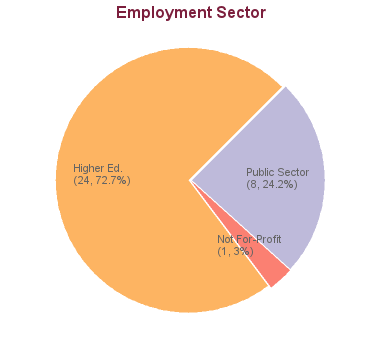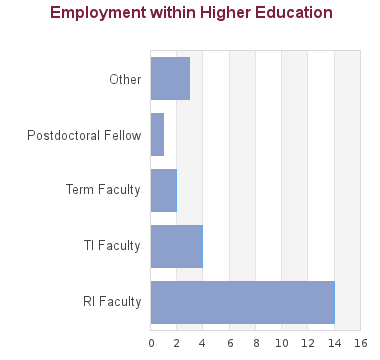Heather McDonald
Job Title
Health Director
Employer
Seabird Island Band

Review details about the recently announced changes to study and work permits that apply to master’s and doctoral degree students. Read more
The Ph.D. program prepares graduates who will provide leadership in the generation, integration, and implementation of knowledge aimed at improving health and health care. Our graduates have expanded spheres of influence in academic institutions, practice settings, and policy arenas. Students join a community of scholars where supervisors are committed to supporting educational programs that meet students’ interests and growth in scholarly engagement with the nursing discipline. All doctoral students must successfully complete a comprehensive examination, an oral candidacy examine, and a research dissertation meeting the Faculty of Graduate and Postdoctoral Studies requirements. Program applicants are admitted based on outstanding achievement in their master's program; evidence of leadership potential for research and scholarship; self-direction; and goals that fit with program resources. Canadian students must hold practicing nurse registration in BC or another province. International students must meet general eligibility criteria for nurse registration in BC. Transfer from the M.S.N. to the Ph.D. program occurs based on Faculty of Graduate and Postdoctoral Studies regulations.
This exciting program prepares researchers and leaders to advance research knowledge, and the dissemination and application of findings to nursing and health care. Students join research supervisors in a community of scholars (other students and faculty members) to develop a program that takes them to new levels of knowledge and skill with career relevant competencies. In addition to core courses, students are encouraged to gain advanced expertise in research methods and other skills through rich course offerings, seminars, colloquia, conferences and independent studies available at UBC. Interdisciplinary collaboration is promoted.
The Faculty of Graduate and Postdoctoral Studies establishes the minimum admission requirements common to all applicants, usually a minimum overall average in the B+ range (76% at UBC). The graduate program that you are applying to may have additional requirements. Please review the specific requirements for applicants with credentials from institutions in:
Each program may set higher academic minimum requirements. Please review the program website carefully to understand the program requirements. Meeting the minimum requirements does not guarantee admission as it is a competitive process.
Applicants from a university outside Canada in which English is not the primary language of instruction must provide results of an English language proficiency examination as part of their application. Tests must have been taken within the last 24 months at the time of submission of your application.
Minimum requirements for the two most common English language proficiency tests to apply to this program are listed below:
Overall score requirement: 100
Reading
22
Writing
21
Speaking
21
Listening
22
Overall score requirement: 7.0
Reading
6.5
Writing
7.0
Speaking
7.0
Listening
7.5
Some programs require additional test scores such as the Graduate Record Examination (GRE) or the Graduate Management Test (GMAT). The requirements for this program are:
The GRE is required by some applicants. Please check the program website.
All applicants have to submit transcripts from all past post-secondary study. Document submission requirements depend on whether your institution of study is within Canada or outside of Canada.
A minimum of two references are required for application to graduate programs at UBC. Each graduate program determines the type of reference (e.g. academic, professional) and number of references they require which can range from 2 to 4. References should be requested from individuals who are prepared to provide a report on your qualifications for the program.
Many programs require a statement of interest, sometimes called a "statement of intent", "description of research interests" or something similar.
Students in research-based programs usually require a faculty member to function as their thesis supervisor. Please follow the instructions provided by each program whether applicants should contact faculty members.
Applicants are expected to identify a faculty member who has agreed to serve as supervisor before the application will be assessed. All applicants are strongly encouraged to speak with the Graduate Programs Admission Officer and/or PhD program coordinator prior to completing the application form, and to seek assistance (as necessary) in identifying a potential supervisor. Applicants should also browse faculty profiles to identify faculty they are interested in working with.
Permanent Residents of Canada must provide a clear photocopy of both sides of the Permanent Resident card.
All applicants must complete an online application form and pay the application fee to be considered for admission to UBC.
| Fees | Canadian Citizen / Permanent Resident / Refugee / Diplomat | International |
|---|---|---|
| Application Fee | $118.50 | $168.25 |
| Tuition * | ||
| Installments per year | 3 | 3 |
| Tuition per installment | $1,875.34 | $3,294.66 |
| Tuition per year (plus annual increase, usually 2%-5%) | $5,626.02 | $9,883.98 |
| Int. Tuition Award (ITA) per year (if eligible) | $3,200.00 (-) | |
| Other Fees and Costs | ||
| Student Fees (yearly) | $1,144.10 (approx.) | |
| Costs of living | Estimate your costs of living with our interactive tool in order to start developing a financial plan for your graduate studies. | |
Applicants to UBC have access to a variety of funding options, including merit-based (i.e. based on your academic performance) and need-based (i.e. based on your financial situation) opportunities.
All full-time students in UBC-Vancouver PhD programs will be provided with a funding package of at least $24,000 for each of the first four years of their PhD from September 2024. The funding package may consist of any combination of internal or external awards, teaching-related work, research assistantships, and graduate academic assistantships. Please note that many graduate programs provide funding packages that are substantially greater than $24,000 per year. Please check with your prospective graduate program for specific details of the funding provided to its PhD students.
This results in a net balance (any funding provided to the student minus tuition and fees) mean of $23,039 and median of $20,411.
All applicants are encouraged to review the awards listing to identify potential opportunities to fund their graduate education. The database lists merit-based scholarships and awards and allows for filtering by various criteria, such as domestic vs. international or degree level.
Many professors are able to provide Research Assistantships (GRA) from their research grants to support full-time graduate students studying under their supervision. The duties constitute part of the student's graduate degree requirements. A Graduate Research Assistantship is considered a form of fellowship for a period of graduate study and is therefore not covered by a collective agreement. Stipends vary widely, and are dependent on the field of study and the type of research grant from which the assistantship is being funded.
Graduate programs may have Teaching Assistantships available for registered full-time graduate students. Full teaching assistantships involve 12 hours work per week in preparation, lecturing, or laboratory instruction although many graduate programs offer partial TA appointments at less than 12 hours per week. Teaching assistantship rates are set by collective bargaining between the University and the Teaching Assistants' Union.
Academic Assistantships are employment opportunities to perform work that is relevant to the university or to an individual faculty member, but not to support the student’s graduate research and thesis. Wages are considered regular earnings and when paid monthly, include vacation pay.
Canadian and US applicants may qualify for governmental loans to finance their studies. Please review eligibility and types of loans.
All students may be able to access private sector or bank loans.
Many foreign governments provide support to their citizens in pursuing education abroad. International applicants should check the various governmental resources in their home country, such as the Department of Education, for available scholarships.
The possibility to pursue work to supplement income may depend on the demands the program has on students. It should be carefully weighed if work leads to prolonged program durations or whether work placements can be meaningfully embedded into a program.
International students enrolled as full-time students with a valid study permit can work on campus for unlimited hours and work off-campus for no more than 24 hours a week during academic sessions.
A good starting point to explore student jobs is the UBC Work Learn program or a Co-Op placement.
Students with taxable income in Canada may be able to claim federal or provincial tax credits.
Canadian residents with RRSP accounts may be able to use the Lifelong Learning Plan (LLP) which allows students to withdraw amounts from their registered retirement savings plan (RRSPs) to finance full-time training or education for themselves or their partner.
Please review Filing taxes in Canada on the student services website for more information.
Applicants have access to the cost estimator to develop a financial plan that takes into account various income sources and expenses.
34 students graduated between 2005 and 2013: 1 is in a non-salaried situation; for 0 we have no data (based on research conducted between Feb-May 2016). For the remaining 33 graduates:


Graduates of our PhD Program have advanced competencies in nursing research and scholarship, research team participation and management, interdisciplinary collaboration, teaching, entrepreneurship, and translating results to action. They are innovative in their approaches to finding solutions to problems in nursing and healthcare delivery. Our graduates follow a long tradition of being recognized leaders in the field of nursing, who are working to advance the profession for future generations. Graduates take leadership roles within the health authorities or business and faculty positions at university and colleges worldwide.
These statistics show data for the Doctor of Philosophy in Nursing (PhD). Data are separated for each degree program combination. You may view data for other degree options in the respective program profile.
| 2023 | 2022 | 2021 | 2020 | 2019 | |
|---|---|---|---|---|---|
| Applications | 26 | 14 | 19 | 23 | 20 |
| Offers | 13 | 8 | 10 | 10 | 10 |
| New Enrolment | 10 | 8 | 7 | 9 | 7 |
| Total Enrolment | 54 | 45 | 44 | 42 | 38 |
Students in research-based programs usually require a faculty member to function as their thesis supervisor. Please follow the instructions provided by each program whether applicants should contact faculty members.
Applicants are expected to identify a faculty member who has agreed to serve as supervisor before the application will be assessed. All applicants are strongly encouraged to speak with the Graduate Programs Admission Officer and/or PhD program coordinator prior to completing the application form, and to seek assistance (as necessary) in identifying a potential supervisor. Applicants should also browse faculty profiles to identify faculty they are interested in working with.
These videos contain some general advice from faculty across UBC on finding and reaching out to a supervisor. They are not program specific.
This list shows faculty members with full supervisory privileges who are affiliated with this program. It is not a comprehensive list of all potential supervisors as faculty from other programs or faculty members without full supervisory privileges can request approvals to supervise graduate students in this program.
The program focuses on improving health care delivery, advancing and applying nursing knowledge, and evolving health policy.
Departments/Programs may update graduate degree program details through the Faculty & Staff portal. To update contact details for application inquiries, please use this form.
